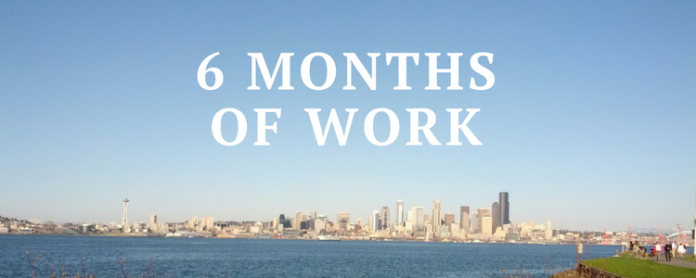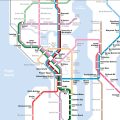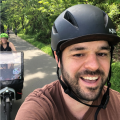During our subscriber drives, we look back at what we’ve been up to over the past year. 2020 didn’t bring a lot of fuzzy moments, but we’re proud of how we persevered.
As the Covid-19 pandemic ramped up in the spring, we struggled with how to proceed and cope, not just as members of an organization but on a personal level. With all-volunteer reporters and columnists, we told everyone to take their time. It was hard to be productive amidst all the chaos, but we wanted to be there for each other.
Covid’s threat to urbanism
Beyond organizational capacity, Covid was destabilizing for the whole urbanism movement. The pandemic provided ample opportunity for skeptics and doomsayers to declare cities over and density and mass transit to blame for the spread.
We pushed back against those ridiculous claims which even a cursory glance at world history (not to mention Seattle home prices) could prove wrong. The pandemic changed the narrative, but fundamentally the case for sustainable walkable urbanism with a housing and transportation system that serves the least privileged as well as the most privileged is still a strong case.
Cities rebound after pandemics–even a near-death experience may not be up to the task of livening up a cookie-cutter suburb or making a drive-everywhere lifestyle more enjoyable. The fears around urban living were overblown. Transit is not a major site of Covid transmission according to the research, and cities that have contained the spread and taken proper precautions have seen ridership surge back. Meanwhile many suburban and rural areas have seen their Covid rates soar even with their sprawling living patterns.
Nonetheless, in America the impulse for many pundits has been to declare transit antiquated: why bother investing in it? This couldn’t be farther from the truth. We argued for transit investment and against austerity with allied organizations. We must hold off deeper economic decline and be ready to hit the ground running when we emerge from this crisis. We must invest in the city we want to see. We should not be jettisoning transit, street safety, and climate mitigation projects, as Mayor Jenny Durkan has proposed.
Seattle transit ridership has seen some rebound from deep lows around May, particularly as more precautions have been taken, lessening the spread and allowing economic activity to pick up a bit.
Fighting back with progressive policy and taxation
And there’s light at the end of the tunnel. While the Trump administration trainwreck has tripped up momentum on transit projects nationwide, an administration led by Joe Biden and Kamala Harris would be much more bullish about investing in transit and hopefully provide a needed boost to high speed rail ambitions across the nation.
Crisis has also brought opportunity for action. After years of flirting with major investment in housing via corporate taxes, Seattle finally did it as Councilmember Teresa Mosqueda deftly shepherded the “JumpStart Seattle” package through Seattle City Council, which overrode a Mayor Durkan veto to defend its year one spending plan. The progressive payroll tax will raise at least $214 million per year from the largest companies in town–revenue that the Council intends to invest in Covid relief, affordable housing, equitable development, and the Green New Deal. That is if Mayor Durkan doesn’t swipe the money first as her budget attempts to do.
Black-led uprising against police brutality
Without the pandemic, it’s also questionable whether Black Lives Matter protests would have swept the nation this summer. An unprecedented number of protesters took to the streets demanding an end to police brutality and racial injustice against Black and brown people–which the pandemic had magnified. The Urbanist joined the call in favor of Black Lives movement and defunding the Seattle Police Department (SPD) by 50% in order to invest in communities or color. We hosted organizer and former City Council candidate Shaun Scott to talk about the protests and police reform in June (video here).
SPD’s repeated brutality against protests and everyone caught in the crossfire–including journalists, small kids, medics, nurses, legal observers, councilmembers, etc.—only made the case stronger. The police department–with the Mayor’s blessing–deployed tear gas on its own people and fought a chemical weapons ban on these dangerous munitions, which constitute a Covid risk factor and have long been banned in war under the Geneva Convention. Seattle is a decade into police reform efforts and it’s time to admit our failure, change course, and try deeper structural change.
Mayor Durkan has so far resisted these calls and blocked the City Council’s efforts and sought to divert attention with her $100 million pledge to communities of color–which it turns out she would fund by swiping JumpStart revenue and draining emergency reserves (the same thing she vetoed the Council’s Covid relief package for doing.) Also, the promised $100 million per year would be disbursed by her hand-picked committee which she has yet to unveil. What could go wrong?
Please become a subscriber if you’re along with us in this fight for justice–even against the toughest circumstances–and if you’re ready to jumpstart an era of progressive change extending the right to the city to all.
[give_form id=”98562″]
Summer Stinson, Executive Director of Economic Opportunity Institute
I rely on The Urbanist for reporting, investigation, analysis, and recommendations for local and state issues. Humans thrive in dense and walkable cities with excellent public transit, public schools, and public parks. Living collectively in a dense city brings me great joy and delight. But this is not the experience for so many in Seattle and our region right now because our city has become a tale of haves and have nots.
What I most love about The Urbanist is that it covers all these issues and many more. The Urbanist acknowledges and understands how interconnected these problems are currently and how we need holistic solutions. The local and state reporting and analysis from The Urbanist is thorough and excellent. I consider myself well-informed and much of that is due to The Urbanist! I am proud to be a subscriber of The Urbanist.
Summer Stinson
Progressive Advocate
Seattle Subway Testimonial
The Urbanist is a great resource for Seattle readers and advocates. They put in the hours to go to planning meetings, read inscrutable public documents, and synthesize what they find along with valuable insights. They bring a lens of curiosity and interest rather than absolutism to the hard questions that face our growing city. They help us stay informed on the issues both big and overlooked that arise around land use and transit in our city.
We are lucky in Seattle to have such a dedicated group of volunteers as those that staff The Urbanist. Join us in making a monthly donation to The Urbanist to help them keep doing the great work they do.
Seattle Subway
Grassroots organization fighting for rapid transit
Seattle City Councilmember Teresa Mosqueda
The Urbanist has been an essential outlet in our city, deconstructing policy ideas in an intersectional way. Recognizing that “the market” alone will never be enough, and that building housing in a vacuum without infrastructure and community assets leads to poor outcomes, The Urbanist’s work to weave social justice into urbanism has been, and will continue to be, exceptionally important to our city as we grow and work toward greater inclusivity.
As Fredrick Douglass said, “Power concedes nothing without a demand. It never did and it never will.” The Urbanist reminds us that the goal is not to seek policy that quiets the concerns of the loudest voices of those who previously held power, but instead to rise up, to speak up, to demand action and pass policies that allow for our urban core to be accessible, affordable, safe, healthy and equitable to all in our quest for a more just society.
Teresa Mosqueda
Seattle City Councilmember
Seattle Bike Blog’s Tom Fucoloro and Kelli Refer
Our family supports The Urbanist because we need local journalists like them who are closely following important housing and transportation news. With their reporting, people can be informed advocates for policies and legislation that create a more just and sustainable Puget Sound region. Please consider subscribing to The Urbanist today.
Katie Wilson, General Secretary of Transit Riders Union
If only there were an online publication that combined timely news reporting, knowledgeable analysis of urban policies, and concern for equity—and also wasn’t afraid to jump into the fray and take a stand on controversial issues.
Oh wait, that exists! It’s called The Urbanist!
The website is an important resource for grassroots organizations like the Transit Riders Union (TRU). We don’t have money to hire staff dedicated to policy and research, or the time to attend every local government committee meeting. It’s great to know that we can visit The Urbanist for insightful, well-researched commentary on current issues.
Katie Wilson
General Secretary of Seattle Transit Riders Union
Former City Councilmember Mike O’Brien
The Urbanist is a great resource for people who care about cities and the people who live and work in cities. In a world where the media is under attack, we are lucky to have independent news sources such as The Urbanist to help all of us navigate all the complexities of people living in cities as our systems continue to evolve. The Urbanist’s insightful analysis on issues ranging from transportation to affordable housing are a great resource and help advance the public dialog around important issues involving our city.
Because of the great value that The Urbanist adds to our city, I am proud to be a monthly supporter of their work. I hope you’ll consider joining in supporting this local, independent media outlet that contributes to making our community more informed.
Mike O'Brien
Former Seattle City Councilmember
Crystal Fincher, host of Hacks and Wonks podcast
What is most engaging about The Urbanist is the sense of possibility of what cities like Seattle, Everett and Kent can be. The Urbanist provides valuable coverage of transportation, housing, land use, and politics that challenges us all to re-imagine what our cities can become and, perhaps most importantly, they inform the public about how we can take action to help achieve that vision.
I can always count on The Urbanist to cover the issues I care about earlier than most other other outlets and with more detail, helping folks to identify how and where engagement can make a difference, and how people can engage in shaping their communities.
Simply put, The Urbanist makes Seattle and Washington better. Let’s show them the support they deserve. I’m proud to chip in for The Urbanist’s essential reporting, and I hope you will, too.
Cary Moon, co-founder of People’s Waterfront Coalition
As I watch the dark energy of Trump, the energy that sows mistrust, creates fear, attacks democracy, pushes people to disassociate from our collective responsibility, I realize venues like The Urbanist serve as an essential backstop to that. When we focus our energy on city-making, we ground ourselves in physical space, rooting ourselves psychologically and emotionally. When we orient ourselves as caretakers of someplace tangible, we recognize our responsibility to our fellow humans.
The Urbanist hosts this essential dialogue, reminding us that our city is always in the state of becoming, inviting us to imagine possible futures. As other places are lamenting the loss of local media and facing the rise of mistrust and alienation, we are fortunate to have The Urbanist. Don’t you love The Urbanist? Let’s all show them the heaps of gratitude they deserve and help sustain their work.
Cary Moon
former Seattle Mayor candidate
Anna Zivarts, Director of Disability Mobility Initiative
I am a proud supporter of the Urbanist. Here’s why: Many years ago, reading the New York City version of The Urbanist — StreetsBlog — was the beginning of my education into transportation policy and politics. This was before Twitter, before Facebook was mainstream, and it was the first time I was able to see that there was a whole wonderful world of people out there who like me, didn’t believe driving and car-dependent communities were the answer. It took another 15 years before I was able to make mobility justice my full-time paid work, but it was reading that blog that made me start to try.
Doug Trumm is publisher of The Urbanist. An Urbanist writer since 2015, he dreams of pedestrian streets, bus lanes, and a mass-timber building spree to end our housing crisis. He graduated from the Evans School of Public Policy and Governance at the University of Washington in 2019. He lives in Seattle's Fremont neighborhood and loves to explore the city by foot and by bike.











